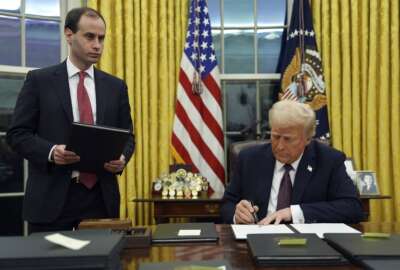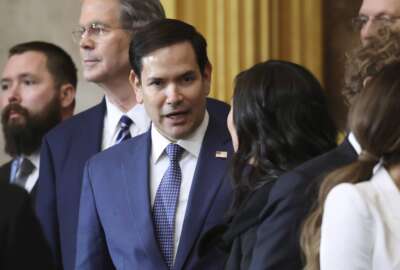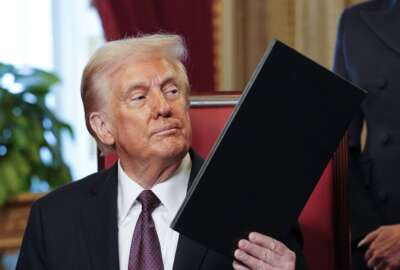
Insight By Grant Thornton
How CIOs can be trusted leaders of transformation
LaVerne Council, the national managing principal for Enterprise Technology Strategy and Innovation at Grant Thornton and a former Veterans Affairs Department CIO,...
Six out of 27 major agencies have acting chief information officers. Changes in the CIO ranks over the last two years have come fast and furious, from the most recent the departments of Health and Human Services and Interior to the fact that the Commerce Department still has an acting CIO for more than two years. In the middle are the ever-growing list of agencies with new technology executives, who face internal and external challenges on a steep learning curve.
The turnover in the CIO role can be attributed to many reasons–changes in agency leadership, new opportunities in the private sector, or just retirement after decades of federal service.
All of these changes can lead to a slowdown in priorities, especially as the administration is starting to get some traction around IT modernization and cybersecurity.
And when new CIOs come into an agency, they have to learn to balance the many regulations, a sometimes slow and arduous contracting process, and a funding cycle that does not always allow for agility, flexibility or course correction.
LaVerne Council, the national managing principal for Enterprise Technology Strategy and Innovation at Grant Thornton and a former Veterans Affairs Department CIO, said agency technology executives have to tackle their challenging roles by combining their mission goals with IT strategies based on data to build trust across the department.
“The whole objective today, especially with technology changing, you have to move quicker. If you take long, you probably are going to be wrong. That’s my tagline,” Council said on the CIOs as Trusted Leaders of Transformation show sponsored by Grant Thornton. “At the end of the day, things are changing so quickly that you don’t want to just be fast, but you want to be smart, agile and you want to be as accurate as you can. Sometimes being very slow brings you a great deal of risk and the ability to leverage all of your opportunities to think about where you can make that change going forward is so important.”
Council said the way to build that trust digital trust internally and externally is to train employees on the latest technology and customer service needs while also limiting the number of devices on their networks and keeping them secure.
“The core to digital trust is the employee itself,” she said. “In order for the organization to have a trusted digital capability, you have to have the people engaged in the change processes that occur in an organization, that feel as though they are part of the solution not that the solution is there is to disable them but they are there to enable growth and innovation, that they feel accountable and the level of teamwork is inclusive of them. They really have an opportunity through the transparency of the CIO to understand where they are going and what’s expected of them.”
To that end, CIOs must invest in their people both on the front end when the employee is hired and over the long term so they can keep up with the constant evolution of technology.
Council said if CIOs are not preparing their workforce for the changes, they can feel overwhelmed and underutilized.
“The best teams that I’ve ever had a change to manage have four core characteristics: They have a great level of understanding of teamwork. They have a great sense of accountability. They act in a transparent manner, meaning they have a great flow of communication and openness about where they are going. And ultimately, they thrive on innovation and innovation means you are trying different things. You may not always be succeeding at them, but you are willing to try and the leadership gives you the kind of air cover to try,” she said. “When you have those kinds of characteristics in your organization you can have that kind of conversation in your organization.”
She said these conversations create internal trust and helps employees have a clear understanding of where the agency is heading.
If employees are clear about what their future looks like, then CIOs can more easily move them out of the “low value” work and into the “high value” work as called for under the President’s Management Agenda. Technologies such as robotics process automation, machine learning and artificial intelligence can help with those processes that used to require people to oversee.
“By the year 2050, we will add $15.7 trillion to the economy just on AI, and nothing else,” Council said. “What does that say? It says the people that think about these things, that understand how to think and make decisions, have to ensure that robot is doing the right thing because it only does what you tell it, and that you are creating digital trust. This is so critical because this is the biggest issue around growth in the digital space.”
Copyright © 2025 Federal News Network. All rights reserved. This website is not intended for users located within the European Economic Area.
Related Stories

Senate confirms Marco Rubio as secretary of state, giving Trump the first member of his Cabinet
Featured speakers
-

LaVerne Council
National Managing Principal, Enterprise Technology Strategy & Innovation, Grant Thornton
-

Jason Miller
Executive Editor, Federal News Radio
Upcoming Events
Related Stories
Top Stories

LaVerne Council
National Managing Principal, Enterprise Technology Strategy & Innovation, Grant Thornton
LaVerne H. Council is Grant Thornton’s National Managing Principal for Enterprise Technology Strategy and Innovation. She has more than 30 years of experience in both the private and public sectors, implementing global technology solutions and supply chain strategies that drive growth and innovation. Council previously served as Assistant Secretary for the Office of Information and Technology and chief information officer (CIO) for the Department of Veterans Affairs; Corporate Vice President and first global CIO for Johnson & Johnson; Global Vice President for information technology, global business solutions, and development services at Dell Inc; and, as the global partner for supply chain at Ernst & Young LLC.
She received the Meritorious Service Award for her work at VA, was twice named one of the Top 50 Women in Information Technology by FedScoop, and also awarded the Golden Gov: Federal Executive of the Year Award. Business Trends Quarterly named her one of the top four CIOs in America. The New Jersey Technology Council inducted her into its CIO Hall of Fame, and the Global CIO Executive Summit awarded her the Top 10 Leaders & Change Agents Award and the Top 10 Leaders & Innovators Award.

Jason Miller
Executive Editor, Federal News Radio
Jason Miller is an executive editor and reporter with Federal News Radio. As executive editor, Jason helps direct the news coverage of the station and works with reporters to ensure a broad range of coverage of federal technology, procurement, finance and human resource news.As a reporter, Jason focuses mainly on technology and procurement issues, including cybersecurity, e-government and acquisition policies and programs.




